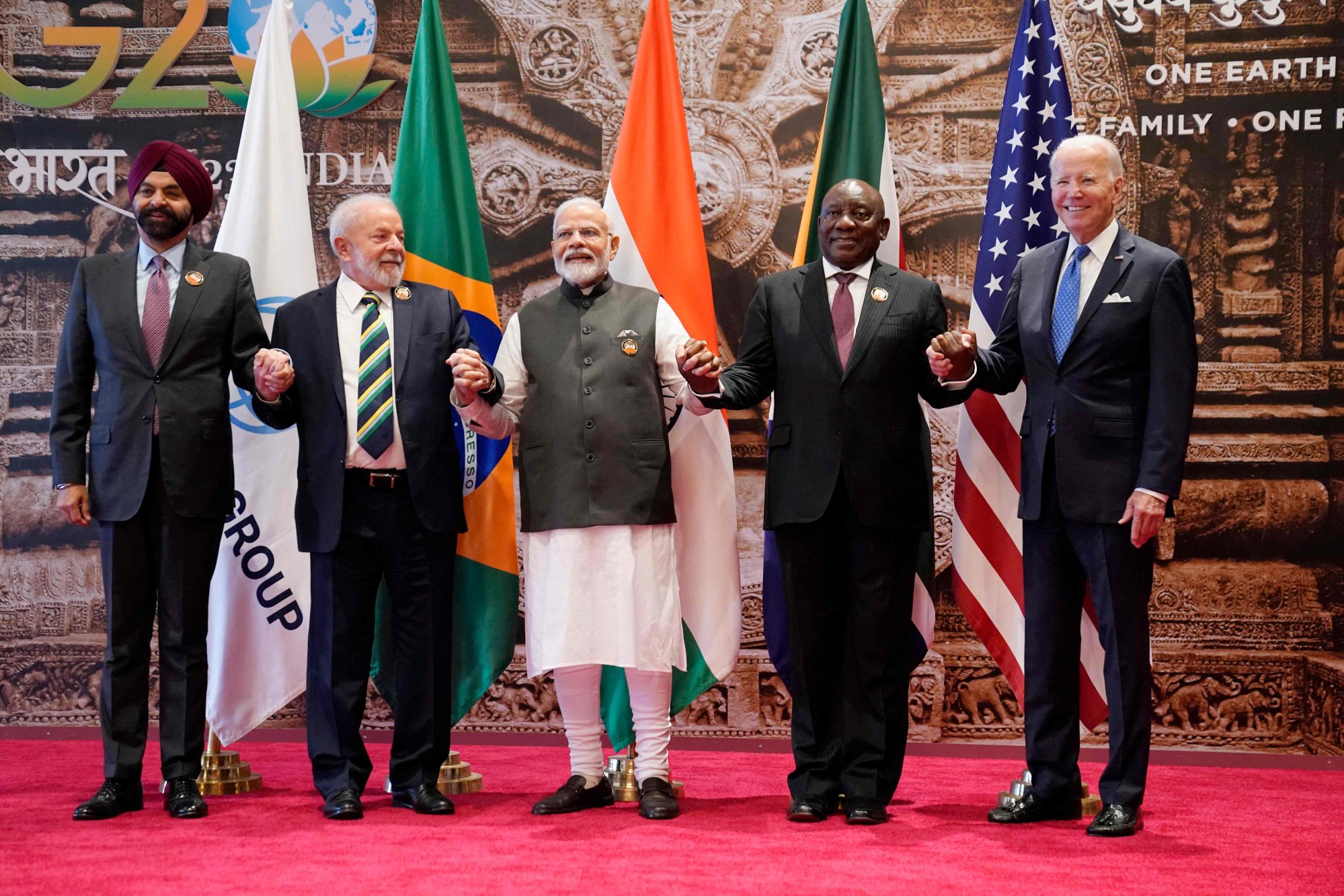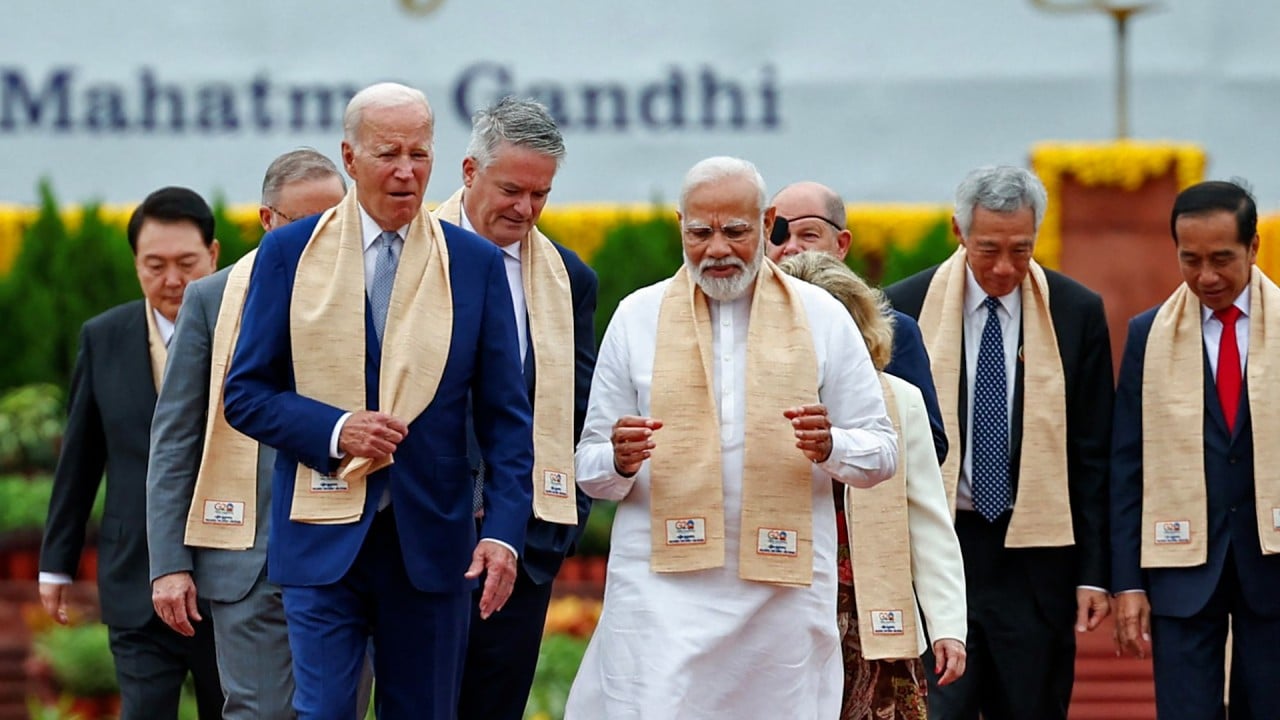
India can be ‘bridge in a polarised world’ amid Global South push, G20 shows
- With the G20 summit – led by India – over, PM Narendra Modi now wants to capitalise on its success, despite widely varying opinions within the bloc
- India can be a ‘counterweight’ to other players and a ‘bridge’ between Russia-China and US-EU, analysts say, which ‘gives it diplomatic heft’
In an interview with India’s WION channel, foreign minister S. Jaishankar credited Modi for the eventual agreement on a communique, which came despite differences of opinion on Russia’s invasion of Ukraine.
Zack Cooper, a senior fellow at the Washington-based Centre for Strategic and International Studies think tank, said India “is trying to show that it is an increasingly important and capable player on the global stage” and “a bit of a counterweight” to other major international players.
India’s Modi hails ‘historic’ belt and road alternative as he cements Saudi ties
“One way to do that is to act as a leading voice for the Global South, which I think is a space that neither the United States nor China is really filling at the moment,” he added.
The Global South refers to middle and low-income nations. India’s push, which saw the 55-member African Union admitted to the G20 at the New Delhi summit, is likely to reinforce its leadership claim, analysts say.
It is also likely to reinforce India’s bid for a permanent seat at the United Nations Security Council, although the task remains arduous, Cooper said, because the decision will require support from the council’s five current permanent members – Britain, China, France, the Russian Federation and the United States.
Analysts say the G20 summit has highlighted India’s ability to build consensus in a divided world.

“India is seen as a bridge in an increasingly polarised world, a bridge between Russia-China and the US-EU. This gives it diplomatic heft,” said Manoj Joshi, a distinguished fellow at the Observer Research Foundation, an Indian think tank.
India’s ability to talk to both sides and its prospering economy is likely to help the Global South, he added.
However, the big challenge for the country in its G20 presidency year – which ends on November 30 – is to deliver on policy declarations, Joshi said.
“In other words, declarations and intentions are fine, but what is needed is deliverables and the ability to deliver,” he said.
The G20 declaration agreed to triple renewable energy output and earmark US$4 trillion annually for climate-change adaptation. It made some progress on cryptocurrency regulations, and signalled its intent to phase out fossil fuels.
Coming of age
Other observers say that this year’s G20 declaration is another symbol of India’s coming of age as a prominent global player.
“Hosting a successful G20 represents India’s big coming-out party in the international diplomatic stage as a budding superpower,” said Sweden-based Matias Otero Johansson, an independent political analyst.
India’s latent potential for rapid growth – as was the case with China – is giving the nation increased weight in international forums, he said.

“As such, the G20 represents a stepping stone towards permanent Security Council membership, which as a major economic and nuclear power, India rightfully deserves,” he added.
India remains one of the fastest-growing major economies, especially as China’s post-pandemic recovery has slowed. In August India’s Chief Economic Adviser V. Anantha Nageswaran maintained his 6.5 per cent growth forecast for the full financial year.
“Some of Modi’s undemocratic tendencies – chiefly his Hindu-nationalist ideas for a large multi-ethnic country – are a concern, but for now there is a lot of goodwill,” Otero Johansson said.
The timing of the G20 summit, which came within days of India becoming the first country to achieve a successful spacecraft landing on the moon’s south pole, would complement a strong narrative as an emerging power, observers say.

It is also likely to help Modi and his ruling Bharatiya Janata Party (BJP) take on a united opposition bloc, the Indian National Developmental Inclusive Alliance, or ‘India’ alliance. It targets what it says is the BJP’s majoritarian politics, whereby a majority – according to religion, class, language or other categories – thinks it is entitled to make decisions for society.
The alliance of 27 parties plans to field joint candidates against Modi’s ruling party in next year’s general election.
The government “has the great capacity to project its achievements. Given that we have an election coming up, we will see a lot of that in the coming weeks”, said Sandeep Shastri, director of academics at the Nitte Education Trust and national coordinator of the Lok Niti network, which studies elections.
India’s opposition is due to hold a meeting this week and is likely to discuss an arrangement to share seats in five state elections taking place towards the end of this year.
The government has called a special five-day session of parliament from September 18-22 but has not disclosed the agenda.
Expectations are that the session is likely to set out proposals to hold simultaneous state and national elections, which would turbocharge the political climate in the coming days and weeks.

The BJP is also set to inaugurate a temple in the town of Ayodhya in the northern state of Uttar Pradesh in January, where a 16th-century mosque was demolished by Hindu nationalists in 1992.
The Supreme Court resolved a decades-old dispute between Hindu and Muslim communities in 2019, when it gave the site to Hindus and gave Muslims a different plot for a mosque.
Modi laid the new temple’s foundation stone in 2020 and said the site had been “liberated”.
“The constellation of achievements [for Modi and the BJP] seems to have hit at the right time, which could climax in the construction of the Ram Temple in Ayodhya,” Shastri said.
Part of the temple is due to open in January, with all building work expected to be completed by 2025, according to The Hindustan Times.
The Hindu epic scripture Ramayana mentions Ayodhya as the birthplace of Ram, a god-king believed by Hindus to be a physical incarnation of Lord Vishnu, one of the principal deities of Hinduism.
Yashwant Deshmukh, an independent political commentator and founder of research firm C-Voter, predicted the G20 event would only add to Modi’s popularity with voters.

“India’s growing stature at the international level is something that has been celebrated a lot by the common man. Modi is seen as the direct catalyst to that,” Deshmukh said. “His personal rapport with world leaders is seen as the strong, confident Indian leadership, which every Indian more or less takes pride in.”
Others agreed that the G20 communique is good news for both India and the world, but said that the gains may not be spectacular.
“The tone of the communique is just a compromise between countries that clearly do not have a common strategy to deal with the brutal invasion of Ukraine by Russia. In that sense, it represents a very small win for India,” said Antonio Fatas, a professor of economics at the INSEAD business school.
‘Unacceptable’ G20 declaration: ‘boldest’ steps needed to tackle climate change
With China challenging the leadership of the US as the world superpower, India had followed a strategy of being pragmatic, not taking sides and hopefully emerging as the third superpower, he added.
India needs to focus on providing the right conditions for its economy to grow and develop, he said.
“While there has been some progress, there are still many barriers, and those should be the priority of India’s government.”


